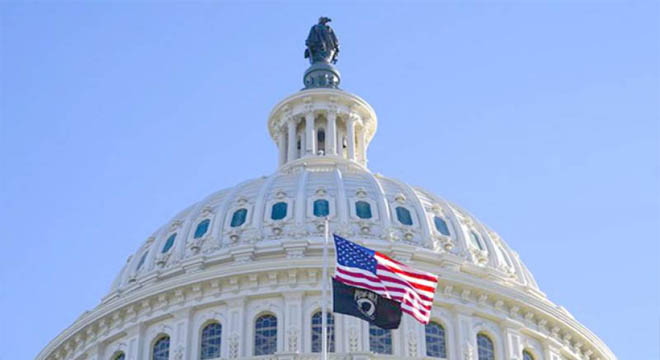Washington-The US Congress opens its new session Sunday, kicking off an explosive week in Washington as Republican lawmakers vow to challenge Joe Biden’s election win, pro-Trump protesters gather and voters in Georgia decide who controls the Senate.
The rebel push by a group of 12 senators loyal to President Donald Trump to block formal certification of Biden’s November victory is all but certain to fail, but has raised tensions on Capitol Hill as lawmakers return to work.
Wednesday’s joint session — paired with a collection of rallies fueled by Trump’s refusal to accept defeat — is certain to be the high point of a fraught week showcasing the deep political divisions roiling the country. On Sunday, when lawmakers take their seats in the House of Representatives, top Democrat Nancy Pelosi faces a possibly tricky battle for reelection as speaker — an office that places her only two heartbeats from the presidency.
The 80-year-old Pelosi’s Democratic Party holds a slim majority in the 435-seat chamber and she is facing no open challenge, but she will need her caucus to remain firm. Then on Monday, Trump stages one of his big, boisterous rallies in Georgia to campaign for two Republican candidates in a fiercely fought pair of runoff elections that will determine the balance of power in the Senate.
Republicans hope he can fuel a surge in in-person voting, but the president – who narrowly lost to Biden in Georgia – has fanned confusion by tweeting that the races are “illegal and invalid.” The special elections take place Tuesday, with Republicans David Perdue and Kelly Loeffler facing Democratic challengers Jon Ossoff and Raphael Warnock.
“Georgia voters have so much power right now,” Ossoff told a campaign event in the small town of Eatonton on Saturday. “You have the power to make this happen.” Victory by Ossoff and Warnock would give Democrats, and Biden, a major boost — seats would be evenly divided between the parties at 50 each, but incoming Vice President Kamala Harris would wield a tie-breaking vote.
Democrats already control the House. “It is a tough battle but within the realm of likelihood that Democrats can win,” Stacey Abrams, the charismatic former Georgia lawmaker who has emerged as a party leader, told CNN on Sunday.
Threat of chaos
Wednesday’s vote to certify the November election results, which Biden won handily with 306 Electoral College votes to 232 for Trump, would usually be a dry, pro-forma exercise.
But Trump has infused it with unprecedented drama as he continues to insist, without foundation, that the election was stolen from him, and as scores of Republican lawmakers back his efforts.
“An attempt to steal a landslide win. Can’t let it happen!” he tweeted. He has urged thousands of his supporters to come to Washington on Wednesday for protests. Similar past events have led to sporadic violence.
Beyond the 12 senators, more than 100 Trump loyalists in the House have vowed to join the last-ditch challenge, thereby forcing both houses of Congress to debate the objections raised before confirming Biden’s victory.
With Democrats controlling the House and many Republicans expected to vote to certify Biden’s election, the bid seems certain to fail.
The maneuver places Vice President Mike Pence in an awkward position: law requires him, as presiding officer of the Senate, to tally each state’s votes and announce the result — his boss’s loss.
On Saturday, Pence’s spokesman said he “welcomes” efforts “to raise objections and bring forward evidence before the Congress and the American people on Jan. 6th,” though he opposed a legal bid that sought to allow him to invalidate the result.
The attention-getting initiative has sharply divided Republicans between Trump loyalists and more traditional party members.
Senator Mitt Romney, the party’s 2012 presidential candidate, on Saturday dismissed it as “nonsense,” saying: “The egregious ploy to reject electors may enhance the political ambition of some, but dangerously threatens our Democratic Republic.”
The move represents a clear defiance of powerful Senate majority leader Mitch McConnell, who has urged members to respect the Electoral College result.
– Pelosi and the Covid factor –
In the House, while Pelosi is confident she has the votes for reelection, the coronavirus pandemic has become a wild card, leaving the attendance of a handful of members uncertain.
While the House changed its rules in May to allow proxy voting due to the health crisis, that change does not extend to the new Congress, so in-person voting will be required.
One newly elected Republican, 41-year-old Luke Letlow of Louisiana, died recently of Covid-19.
Pelosi, the first woman in US history to serve as House speaker, has signaled that this will be her final turn as speaker and possible her last term in the House.
Follow the PNI Facebook page for the latest news and updates.









